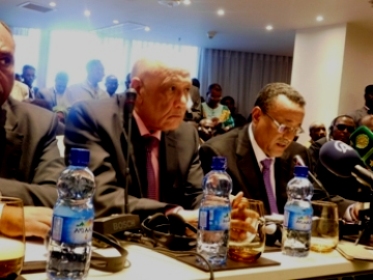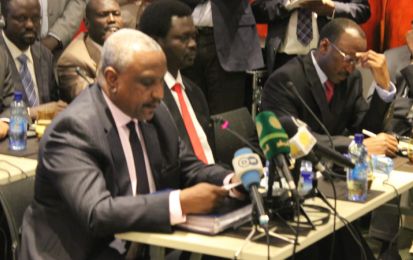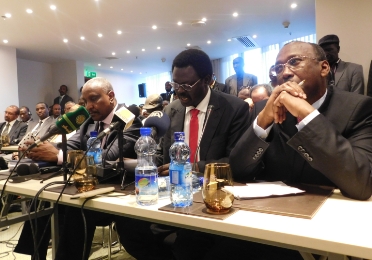Sudanese gov’t, rebels vow to reach cessation of hostilities deal
By Muzdalfa Osman
November 19, 2015 (ADDIS ABABA) – Sudan’s government and armed groups Thursday pledged on to exert the necessary efforts to reach a humanitarian cessation of hostilities and work for peace and stability in the whole country.

The opening session was attended by the US special envoy Donald Booth, and some British diplomats as well as representatives of the East African regional bloc, the Intergovernmental Authority on Development (IGAD).
Chief mediator and AUHIP head, Thabo Mbeki praised in his speech the unilateral declarations of the cessation of hostilities by both parties. He stressed that in this round they have to discuss a cessation of hostilities agreement as they recognize the importance and urgency of the matter.
Mbeki also underlined that the national dialogue preparatory meeting should be held in line with the 5 September 2014 agreement reached by the national dialogue committee, the Sudanese Revolutionary Front (SRF) and the National Umma Party (NUP) of Sadiq al-Mahdi.
Sudanese government officials refuse the organization of the pre-dialogue meeting but admit that a mini preparatory meeting the SRF factions and NUP can be held in Addis to discuss their participation in the internal national dialogue process.

Arman mentioned the ongoing efforts to achieve a comprehensive solution in Sudan adding that “what encourages them in the SPLM delegation, that the tenth round of talks focuses on the need to seal a cessation of hostilities for humanitarian purposes”. He said this step responds to the suffering and needs of millions of Sudanese citizens in the three war affected regions in Sudan.
He reiterated the SPLM full commitment to work for the success of the current round of talks, noting that the delegation comprises 21 representatives from the different regions to reflect Sudan’s diversity and their vision to establish the concept of unity in diversity and reach the widest possible extent and the involvement of Sudanese.
Arman further expressed the SPLM-N support for an inclusive pre-dialogue meeting which should be held in line with the African Union Peace and Security Council (AUPSC)’s decision 539.
“It is important to set a date for the preparatory meeting and to extend invitations to the Sudanese parties without exclusion, to the extent that it opens a new opportunity for a comprehensive political process to stop wars, ensures freedoms, and reaches an agreement on procedural issues for the dialogue conference, as well as enabling the AUHIP to facilitate and bring regional and international support for real process of national constitutional dialogue”.
The SPLM-N secretary-general was keen to underline the need to address the demands and specificities of the war affected regions such as self-rule and economic development within the national framework.
He also accused the Sudanese government troops of continuing attacks on the SPLM-N positions despite the unilateral cessation of hostilities, and called for an African mechanism to monitor any humanitarian truce. He also called on the government to allow the chief mediator Thabo Mbeki to visit affected civilians in the war zones.
The Sudanese army has been fighting SPLM-N rebels in South Kordofan and Blue Nile states since 2011 and the armed movements in Darfur since 2003.
GOVERNMENT AMBITIONS END OF WAR
The head of the Sudanese government delegation presidential assistant Ibrahim Mahmoud Hamid, from his side, also reiterated the government willingness to reach a cessation of hostilities with the SPLM-N.
Hamid further said his delegation wants that this humanitarian truce be followed by discussions on a permanent ceasefire paving the way for the implementation of the outstanding issues in the Comprehensive Peace Agreement of 2005.
He further said the parties should build up on the previous nine rounds of talks to reach without delay a political agreement and humanitarian deal allowing to provide civilians in the war zones with the necessary assistance.
Despite his continued reference to the need to settle the conflict of the Two Areas within the framework of 2005 peace agreement, the presidential aide said that “More than ever this is the right time to reach a (negotiated) settlement after the launch of the National Dialogue Conference on 10 October without excluding any one including movements that take up arms against the State”.
He said his government provided all the needed guarantees to enable the rebel groups to return to Sudan and participate in the dialogue conference whenever they want. He stressed they look forward to see the armed and political opposition group joining this conference which “aims to discuss the major challenges facing the country”.
On 22 September, President Omer Hassan al-Bashir issued a republican decree granting general amnesty for the leaders and members of the armed movements taking part in the national dialogue conference. Also, he issued another presidential decree declaring a two-month cease fire in the battlefronts.
DARFUR TRACK

The chief negotiator of Justice and Equality Movement (JEM) Ahmed Tugud told the opening session that his group is willing to sign a cessation of hostilities agreement, paving the way for a negotiated settlement in the region.
“We and the Sudan Liberation Movement – Minni Minnawi have declared a unilateral cessation of hostilities. Now we confirm this declaration by negotiating a cessation of hostilities to facilitate humanitarian relief and create favourable conditions for the achievement of peace.”
He further said JEM supports the efforts of the African mechanism to achieve peace in Sudan and expressed wishes that this round of talks leads to a cessation of hostilities and paves the way for a national dialogue process.
Tugad who led last year the joint delegation of the two groups for Darfur track said they are committed to the AUPSC decision 539 of 25 August 2015 that calls for a comprehensive solution in Sudan.
Minni Minnawi in a short speech said that the ongoing conflict in Sudan is a political one and can only be resolved through a negotiated agreement.
“Therefore the cessation of hostilities that should lead to cease-fire and political negotiations for Darfur and the Two Areas is the right approach,” Minnawi added.
Speaking on the behalf of the rebel umbrella SRF, he further reiterated their support for the “AU resolutions 456 and 539 which call the parties to stop the ongoing war and engage into political negotiations as a prelude for comprehensive national dialogue”.
He also said they intend to “negotiate in good faith” for a humanitarian access to the needy in the conflict affected areas. He called for monitoring mechanism to ensure its implementation.
The rebel leader recalled that the humanitarian access and the cessation of hostilities are part of the confidence building measures – including the release of political detainees, prisoners of war, and freedoms – necessary for the creation of a conducive environment before to join the dialogue conference.
“We also like to call upon the international community to help in every possible way it can,” he stressed.
The head of the government delegation for the talks with Darfur groups Amin Hassan Omer refused to take part in the opening session saying the Darfur track should be held separately from the track of the Two Areas.
Omer told Sudan Tribune that his delegation is ready to set with Darfur groups to reach a cessation of hostilities to create a conducive environment for the national dialogue process and reactivate the peace process in the western Sudan region.
However he underscored that Addis Ababa is not the appropriate place to discuss political issues pertaining to the western Sudan and Doha remains the right place for any peace talks on Darfur based on the Doha Document for Peace in Darfur (DDPD).
“The armed movements are talking about a humanitarian cessation of hostilities , while the humanitarian operation in Darfur continues. Actually they do not talk about the humanitarian problem in areas controlled by the government, but in areas where they hold its residents hostage and use them as human shields.
“So they want to make them part of the conflict tools,” he said.
But Minnawi defended their participation in the joint opening session saying the two tracks are part of one process for peace in Sudan.
“War is the problem of the whole Sudan and there is a need for a comprehensive peace agreement,” he added.
(ST)
